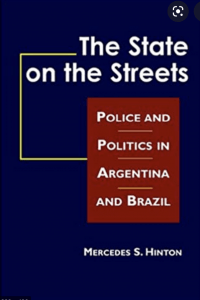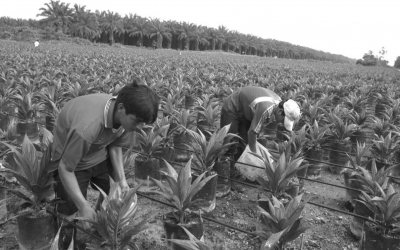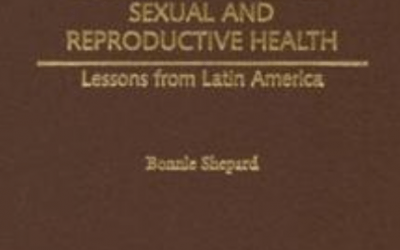A Review of The State on the Streets: Police and Politics in Argentina and Brazil
State, Society and Police Forces
 The State on the Streets: Police and Politics in Argentina and Brazil
The State on the Streets: Police and Politics in Argentina and Brazil
By Mercedes S. Hinton, Lynne Rienner
Boulder, CO, 2006, 235 pp.
The most basic function of the state is to provide order to its society. Good states provide order with justice that is consistent with the citizenry’s notions of fairness. The police are the peacekeepers among citizens and the gatekeepers of the criminal justice system. In daily life, for most people the police are the law. Hence people’s judgments about democratic governance, integrity, justice, and personal safety are shaped in good part by the police conduct that citizens see with their own eyes or through the mass media. What are the implications for the social order, then, when the majority of the citizens view most of the police as inept, corrupt, inefficient, and untrustworthy, or even as lawless and brutal? With Chile as a notable exception, this is the unhappy case of most of the Latin American countries and of Buenos Aires and Rio de Janeiro, the specific cases presented in The State on the Streets.
For reasons we do not fully understand, increases in violent crime accompanied the shifts in Latin America toward democracy and market economies that began in the 1970s and continue into the present. The increases were more pronounced in some countries—for example, in Guatemala, El Salvador, and Brazil—than others, but the overall pattern is clear. As is to be expected, perceptions of increases in violent crime create a sense of public insecurity, whether the homicide rate is comparatively low (5.4 per 100,000 in 1999 in the case of Buenos Aires) or high (37 per 100,000 in Rio de Janeiro). Yet probably more important than the link between perceptions of violent crime and insecurity are evaluations of the effectiveness of the criminal justice system and especially of the police. Even with the comparatively lower crime rate in Buenos Aires, a 1999 survey taken in the metropolitan area found that “86 percent of the population felt insecure and considered the likelihood of their being the victim of a crime within the following year to be high” (Hinton, p. 20). In general, throughout Latin America opinion polls in recent years report that insecurity ranks among the top two or three problems cited. The same polls also report generally low evaluations of police and justice systems.
If democratic transition is associated with heightened insecurity, is it also generating greater capacity for problem-solving? On this Hinton is clearly pessimistic: This book argues that notwithstanding differences in the scale of public insecurity, Argentina and Brazil share a common family of problems that have hindered the transformation of the police into an institution capable of providing the kind of public service befitting a democracy. Far from being exclusive to the police, such problems as lack of accountability and corruption are endemic at most levels of the Argentine and Brazilian state (and indeed society). Civil society has not yet demonstrated that it is capable of organizing effectively to ensure the establishment of responsible governance of most core state functions. In both countries, police reform attempts have been framed by a political game whose principal components are uncivic attitudes toward public office, low levels of public accountability, and destructive forms of political competition. The book conceptualizes the political game and its pernicious effects on national life (Hinton, p. 11).
Even allowing for economic crisis, fiscal stringency, and varieties of bureaucratic problems, for Hinton the key obstacle to police reform is bad politics. Elected officials lack the time and incentives to address deeply rooted problems of systemic corruption and criminality in police forces. Instead, they engage in high-profile actions such as periodic purges of corrupt police officers, the purchase of vehicles and technology, or consultations with celebrity law enforcement figures. Their purpose is not to address the underlying causes of insecurity but rather to cast blame on political opponents and to seek short-term advantage in public opinion and electoral competition. At the same time, the political culture fails to hold elected officials accountable for their inaction. The police are thus trapped in a perverse situation. “With impunity, backtracking, and betrayal of the rules of the game [by elected officials], to expect the police to have played their cards straight would be to pretend that they were not embedded in the context in which they operated” (Hinton, p. 194). Instead of seeking solutions, public officials engage in a “praxis of expediency” to provide “an illusion of reform” (ibid.)
Hinton leaves us with the sense that Argentina and Brazil are inescapably caught at a low equilibrium. The 2003 election of Néstor Kirchner in Argentina opened yet another round of expediency and illusion with still more purges of the police and military. Luis Inácio “Lula” da Silva, elected as Brazil’s president in October 2002, launched a high-profile comprehensive plan to improve public security but failed to give it the necessary priority and political support. His new minister of public security lasted ten months in office, gang violence surged in large cities, and da Silva’s government became mired in a series of corruption scandals.
A strong case can be made that the police and administration of justice are central to the quality of democracy. The integrity of the electoral system is a prerequisite for democracy in its narrow, procedural sense, but the integrity and competence of police and courts provide essential assurance about fairness and trust in daily life. Only fairly recently have political scientists begun to focus on these actors, producing a literature that is more developed on administration of justice, taken largely as judicial reform. The police remain, however, relatively understudied.
In this sense, Hinton’s book is a valuable comparison of police reform in two important cities. Like the orientation of most problem-oriented studies, her approach is eclectic, giving us historical background, analyses of data on crime, public opinion, and budgets, and detailed descriptions of the actors, decisions, and dynamics of reform episodes. Her principal method is in-depth interviews, 165 in all, of a broad range of government officials and private citizens in the two countries. The result is an impressive grasp of the realities of police work. For example, Hinton conveys vividly the pragmatic maneuvering of a newly appointed head of the Rio civil police in 1995. Recognizing that certain forms of petty corruption were inevitable, “he made a pact with the Grupo Astra—a clandestine and powerful group of detectives—setting the limits of what he would tolerate” (p. 135). At the same time that Hinton gets the details right, she also grounds her book effectively in the mainstream work on the quality of democracy in Latin America. And if the thesis is pessimistic, it is a competently researched and well-reasoned pessimism.
Related Articles
Editor’s Letter: Social Enterprise
The red and orange leaves of autumn drift past my window. It’s hard to believe that more than two months have gone by since I returned to ReVista from a year’s sabbatical on a Fulbright Fellowship in Colombia.
Review of Effective Management of Social Enterprises: Lessons from Businesses and Civil Society Organizations in Iberoamerica
This excellent book is the product of a collaboration of leading universities in Latin America and Spain under the leadership of the Social Enterprise Knowledge Network and with support of the AVINA Foundation….
Review of Running the Obstacle Course to Sexual and Reproductive Health: Lessons from Latin America
Although the idea of learning from Latin America is too often counterintuitive for readers used to viewing the world by default through the lens of the north, the continent regularly generates political …




